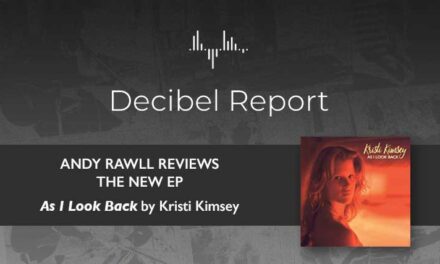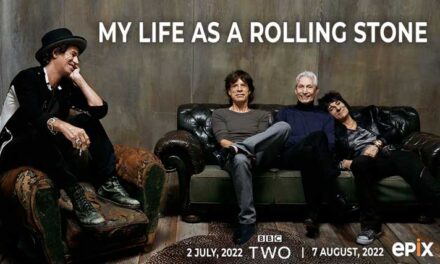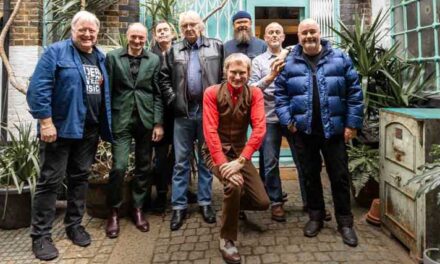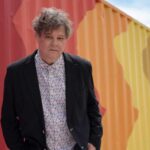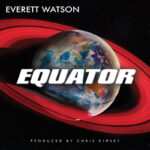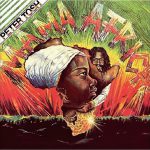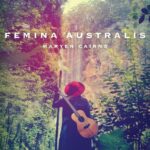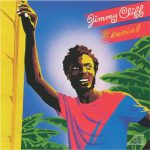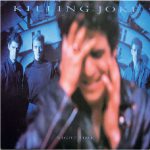KEXP Exclusive Interview | Peter Perrett

photo credit: Steve Gullick
 Sadly, the Only Ones broke up in 1980 after three brilliant albums that still sound as good today as they did then. For all intents and purposes, Peter Perrett became a recluse, disappearing into a haze of drugs, only coming up for air briefly in 1996 with a group called The One. While not reaching the lofty heights of the Only Ones, the recordings they made (one EP and one album) are a fine addition to the Perrett canon.
Fast-forward to 2017 and, miraculously, Peter Perrett is back with an album entitled How The West Was Won that is so strong I can barely believe my ears. It feels unhurried, effortless and confident. The songs are solid and smart, full of wry observations on the human condition and brimming over with Peter’s mordant sense of humor. Cause for celebration, indeed!
I spoke with Peter about How The West Was Won by phone from his home in London on June 6th.
Peter Jesperson: Let’s start with the new album. You have been outspoken about being drug-free for the first time in many years. Did you clean up and then decide to make a new album… or did you want to clean up in order to make a new album?
Peter Perrett: There was no grand plan behind it. It was a case of the survival instinct kicking in at the very last minute — to sort of prevent physical extinction basically. And making the album was a fortuitous consequence of it. I found myself in a place where I was wanting and able to make music again. But the initial drive behind it was to prevent (laughs) imminent extinction of the species.
Was the process of writing and recording again therapeutic?
Yeah. Music is the best therapy. When you find yourself with a lot of time on your hands, when you were previously occupied in other ways… something that is that pleasurable to do, it’s the best therapy of all. Music is used as therapy in lots of different human conditions. And for me personally, it was my salvation. My ability to make music and to actually be in a position (to) make an album and get it out to people was even more inspiration. Because you have to feel music. If you don’t feel it, then what’s the point? Substance addiction tends to numb all feeling. To me it was either one or the other. I couldn’t see the point of listening to music even, let alone playing it when I was otherwise occupied.
I’m struck by how the album sounds perfectly in line with your previous work. It’s like you didn’t miss a beat. After such a lengthy break from music, did it feel like writing the songs was a continuation of what you’ve always done or did it feel new somehow, writing while clean? And was it hard for you to write clean?
It was both. Obviously, it was a continuation of my previous work because it’s me writing the stuff and there is a link, but it felt completely new because it was hard to remember two or three lifetimes ago, and it feels like I’m doing it for the first time. When I did it before, it was literally another world. I feel like a newborn baby, which sometimes you do when you come out of decades of internal exploration. So yeah, it’s both. A continuation, obviously because it’s me writing the songs and I’m still me. But it feels like doing it for the first time. And being one of the unclean was a full-time occupation. It’s the complete opposite. It was the only way I was ever going to write again, by getting clean because you have to. To me, music has always been about passion and fun. And I think other distractions inhibit your ability to enjoy things to the fullest. It wasn’t hard to write clean. I never did write when I had a serious addiction. That’s the whole point of why I haven’t done anything for such a long time. In the mid ’90s, I was briefly productive for a couple of years when I did the album, Woke Up Sticky but, apart from that, it’s been a very long time.
Sadly, the Only Ones broke up in 1980 after three brilliant albums that still sound as good today as they did then. For all intents and purposes, Peter Perrett became a recluse, disappearing into a haze of drugs, only coming up for air briefly in 1996 with a group called The One. While not reaching the lofty heights of the Only Ones, the recordings they made (one EP and one album) are a fine addition to the Perrett canon.
Fast-forward to 2017 and, miraculously, Peter Perrett is back with an album entitled How The West Was Won that is so strong I can barely believe my ears. It feels unhurried, effortless and confident. The songs are solid and smart, full of wry observations on the human condition and brimming over with Peter’s mordant sense of humor. Cause for celebration, indeed!
I spoke with Peter about How The West Was Won by phone from his home in London on June 6th.
Peter Jesperson: Let’s start with the new album. You have been outspoken about being drug-free for the first time in many years. Did you clean up and then decide to make a new album… or did you want to clean up in order to make a new album?
Peter Perrett: There was no grand plan behind it. It was a case of the survival instinct kicking in at the very last minute — to sort of prevent physical extinction basically. And making the album was a fortuitous consequence of it. I found myself in a place where I was wanting and able to make music again. But the initial drive behind it was to prevent (laughs) imminent extinction of the species.
Was the process of writing and recording again therapeutic?
Yeah. Music is the best therapy. When you find yourself with a lot of time on your hands, when you were previously occupied in other ways… something that is that pleasurable to do, it’s the best therapy of all. Music is used as therapy in lots of different human conditions. And for me personally, it was my salvation. My ability to make music and to actually be in a position (to) make an album and get it out to people was even more inspiration. Because you have to feel music. If you don’t feel it, then what’s the point? Substance addiction tends to numb all feeling. To me it was either one or the other. I couldn’t see the point of listening to music even, let alone playing it when I was otherwise occupied.
I’m struck by how the album sounds perfectly in line with your previous work. It’s like you didn’t miss a beat. After such a lengthy break from music, did it feel like writing the songs was a continuation of what you’ve always done or did it feel new somehow, writing while clean? And was it hard for you to write clean?
It was both. Obviously, it was a continuation of my previous work because it’s me writing the stuff and there is a link, but it felt completely new because it was hard to remember two or three lifetimes ago, and it feels like I’m doing it for the first time. When I did it before, it was literally another world. I feel like a newborn baby, which sometimes you do when you come out of decades of internal exploration. So yeah, it’s both. A continuation, obviously because it’s me writing the songs and I’m still me. But it feels like doing it for the first time. And being one of the unclean was a full-time occupation. It’s the complete opposite. It was the only way I was ever going to write again, by getting clean because you have to. To me, music has always been about passion and fun. And I think other distractions inhibit your ability to enjoy things to the fullest. It wasn’t hard to write clean. I never did write when I had a serious addiction. That’s the whole point of why I haven’t done anything for such a long time. In the mid ’90s, I was briefly productive for a couple of years when I did the album, Woke Up Sticky but, apart from that, it’s been a very long time.


“just like everybody else I’m in love with Kim Kardashian she’s taken over from J-Lo as my number one even though I know she’s just a bum in another time line I would’ve stared at her all day long without ever wanting to see her from the front God knows I love America”Well, you know, part of the attraction of writing that line is that I’m aware of the different meanings that word has on different sides of the Atlantic. I like lyrics that are ambiguous. Humor has always been a big part of my writing and it made me laugh when I wrote it as well.

“Just like the experiment with the rat he could choose food or he could choose crack well the rat he starved to death but I didn’t die at least not yet I’m still just about capable of one last defiant breath”What makes it really special is that we borrowed a 1962 Gibson with P-90 pickups. I think that helps it really, as they say, “Rock.” It makes it even more powerful than it would have been if we’d carried on using Fenders. He used the Gibson in places on other songs, like on the chorus of “Sweet Endeavor,” but this was the only track where he just used the Gibson all the way through. Chris was in the live room while Jamie was getting his sound and Chris said, ‘That’s just over the top, that’s just too… you can’t do that.’ And Jamie said “Well, just go in the control room and see what it sounds like with the track.” And once he went into the control room it was like, ‘Perfect!’ Because it gives it dynamics. With all the songs, when (just) the verses and the vocals are there, it’s quite sort of empty so when this really heavy guitar comes in, it just gives it a dynamic that is perfect and, like you said… gallows humor is my specialty, it’s one of my strengths. We’d already got to the point in making the album where Chris was saying, ‘No more new songs, we’ve already got enough.’ That was the last song that we recorded. When he heard it he said, ‘OK, we’ll include this one.’ So, it’s got a special place in my heart as well. And the last song, “Take Me Home” — I’m a big fan of closing songs that are meant to be closing songs. Did you write this one specifically to end the album? I find the words puzzling. Where did this one come from? (laughs) You think of me as being greater… I wish I could say I was that clever and premeditated but I just write songs. And then I chose ten out of the 16 and tried to put them in an order that felt like it was an emotional journey. And I was mucking about with different orders. I think my manager suggested, ‘That sounds like a closer.’ And, as soon as I put it at the end of the sequence of songs, it was THE perfect last song, as perfect as I could’ve dreamed of. Just everything about it. It’s slightly anthemic, it’s sort of got a melancholy feel to it. What I really like about the album is that it feels like a journey all the way through. With the first Only Ones’ album, I was very pigheaded about not wanting to make music too easy listening so I purposely (put) a slow song, then a really fast song, then a slow song, because I wanted to constantly make people uncomfortable and to not be able to listen to it as background music. And I don’t think that made for too easy a journey. I was more about shaking people out of their lethargy rather than making something an emotional journey all the way through. But I think I got the right order for this one. I think I chose the ten best songs to make an album. There are other songs I can’t wait to record but, for this album, I’m really happy with the finished product. I had two other questions about this song but if I’m asking you to explain something you don’t want to, no worries. But I have to say that another really startling line is in this song – “I wish I could die in a hail of bullets sometime”:
“like brother and sister in the war sharing their rations trying to survive I wish I could die in a hail of bullets some time but all I can do is sing and play on the front line”I’ll give you a clue to the second verse, I won’t tell you what it’s about for me personally. I wrote it after watching the documentary The Siege Of Leningrad and, was it Shostakovich whose symphony (the hostages performed)? Yeah. So that’s a clue… after watching that, I wrote the second verse. Though the 2nd verse means something different to me. But it is related to that documentary and Shostakovich because his symphony, they were using it… they weren’t soldiers that could fight but they could use music as a means of defiance. Well, that wraps up the song part of it. I have a few more questions if you don’t mind me continuing a bit. That’s ok, yeah.





